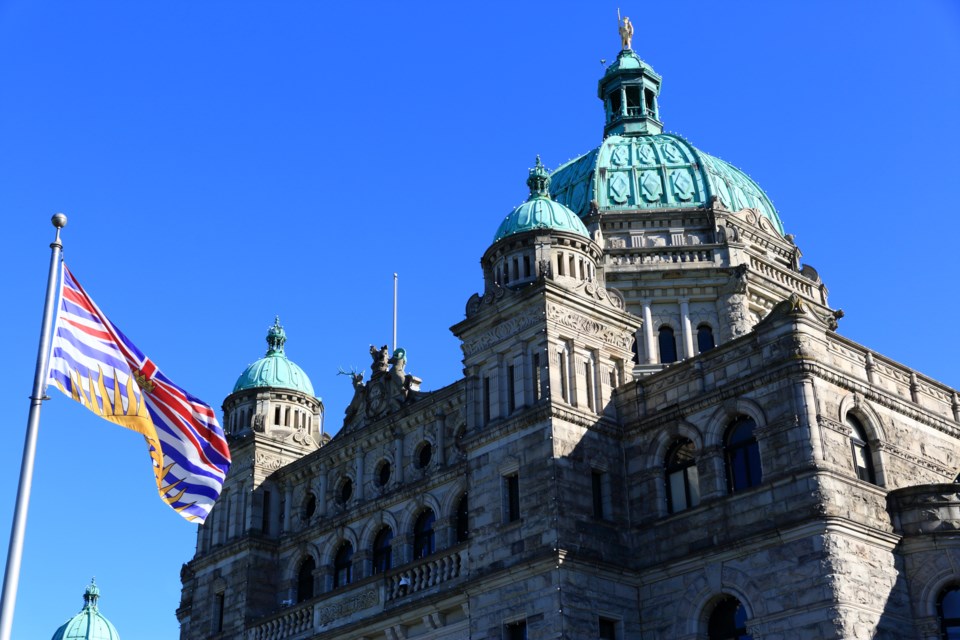There’s still another month before the B.C. government’s next budget update, but new data indicates it could be a fiscal bloodbath for the NDP government.
Statistics Canada data released Thursday on the province’s economic growth shows it has shrunk over the last two years when adjusted for population, according to an analysis by the Business Council of BC.
B.C.’s GDP per capita fell 1.8 per cent in 2024, which is the second-worst among provinces, council vice-president David Williams wrote in his analysis Tuesday.
“B.C.’s economic performance over recent years has been poor, especially when considered in population-adjusted terms,” he wrote.
“While it can be tempting to blame the province’s economic woes on President Trump’s policy agenda, our home-grown challenges are evident in the data long before his inauguration on Jan. 20, 2025.”
B.C.’s March budget projected a $10.9-billion deficit for 2025/26, though it’s likely closer to $13 billion currently with the elimination of the carbon tax and associated revenue.
The province’s taxpayer-supported debt has more than tripled since the NDP took office in 2017, and metrics such as debt-to-revenue as well as debt-to-GDP have at least doubled, as have interest costs. Two financial agencies downgraded B.C.’s credit rating in the last three months.
“A turnaround in the province’s economic fortunes over the next two years seems unlikely,” writes Williams.
Finance Minister Brenda Bailey’s dismal budgetary numbers still assume the province’s economy will grow 1.8 per cent this year. An analysis last month from TD Economics forecast 1.5 per cent in 2025 falling to 1.3 per cent in 2026, as B.C. unemployment rises and housing starts drop.
Veteran economists Jock Finlayson and Ken Peacock say “government operating and capital spending became completely untethered from economic reality” shortly after Premier David Eby blew through a $6-billion surplus in 2023.
Since then, they say the BC NDP have crafted budgets that “shun fiscal discipline and stick with an economic plan underpinned by an ever-expanding public sector.”
“Under the updated plan set out in the budget, B.C. is on track to run five consecutive operating deficits,” they wrote in a new analysis Monday.
“Even before Donald Trump, these were expected to add at least $45 billion to the net debt. Over the same period, capital investments add another $60 billion or so. This year, total taxpayer-supported debt has already doubled compared to where it stood under former premier John Horgan.”
The Eby administration keeps blaming Trump’s global tariffs, and widespread economic uncertainty, for its financial predicament. But the economists note the province’s current fiscal position it not a result of Trump.
“In just a few years, British Columbia has gone from being one of the most fiscally sound provinces, with a low debt load and a stellar credit rating, to being in perhaps the weakest financial position of all major Canadian jurisdictions,” write Finlayson and Peacock.
“Having dug itself into a very deep fiscal hole under the leadership of Premier David Eby, and with the economy already on shaky ground before the trade turmoil that erupted in early 2025, B.C.’s financial outlook is not only dismal — it looks poised to worsen.”
New Democrats are getting conflicting advice on what to do next.
The Business Council suggested reducing spending to return to balanced budgets, removing PST from capital inputs (a longstanding request of the business community) and reducing top personal income tax rates.
The BCGEU, which is currently threatening a strike, suggested the opposite, calling on government to raise taxes on corporations and high-income earners, as well as increase fees and royalties on major new business ventures like mining and LNG.
The NDP is in the middle of what appears to be a largely half-hearted affair at cutting spending, and anything else it does won’t be fast enough to make a difference in September’s next quarterly budget update.
“Given trade headwinds, a weakening economy, softening revenues across multiple fronts and B.C.’s obvious fiscal mismanagement, we anticipate an operating deficit of $16 to $18 billion — the biggest among the 10 provinces on a population-adjusted basis,” write Finlayson and Peacock.
Meaning the largest deficit in B.C.’s history could be getting larger, as the province’s overall economic health continues to get worse.
Rob Shaw has spent more than 17 years covering B.C. politics, now reporting for CHEK News and writing for The Orca/BIV. He is the co-author of the national bestselling book A Matter of Confidence, host of the weekly podcast Political Capital, and a regular guest on CBC Radio.
🚨New newsletter alert! Stay ahead of the curve in B.C. politics. Get expert political analysis delivered straight to your inbox, plus inside scoops and other stories from across the province. Sign up here for the Capital & Coast newsletter.




